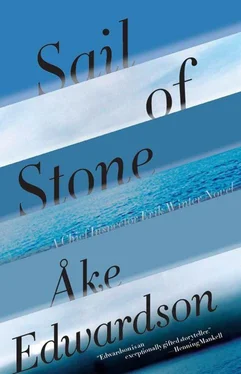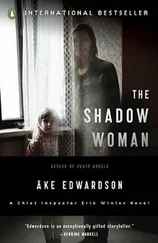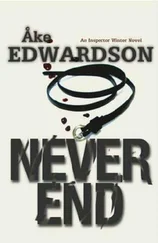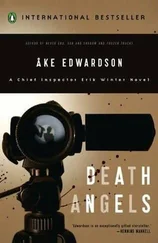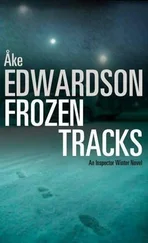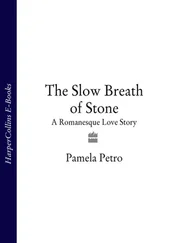But if he were alive? If John Osvald were alive? Those who still existed, those who were here… could you call them the surviving relatives, then? Was Johanna Osvald a surviving relative?
Winter asked a woman outside the store for directions to the school. She answered and pointed, a crooked movement.
He walked along a narrow street without sidewalks and could smell the sea, and he listened to the peculiar silence that is created by lots of space in every direction. The wind had disappeared in here, as though it didn’t exist. The clouds had disappeared; the sky was completely blue. He felt warmth on his face.
There were many children on the playground, more than he’d expected. He heard shouts but no words. A soccer ball rolled his way and he sent it back. It flew over the goal and the fence behind it and disappeared into the crevice of a cliff.
“Aaah-oh,” said a boy who looked like a short fisherman.
The other children looked at Winter and then at the cliffs. He understood. He went out again and around the playground and he climbed down into the crevice. The ball wasn’t there. He dug around through grass and other strange plants, maybe seaweed. To the right was a hole, like a cave. He peeked in but didn’t see anything. He started to crawl. He felt the ball before he saw it, and he wiggled himself backward and his suit stretched at the seams, protesting. Winter got up with the ball in his hands, a triumphant gesture. All the children were standing in a line up there, and they applauded. Winter threw the ball up and the little fisherman took it. He and all the others turned around when they heard a female voice:
“And what are you all doing here? The bell rang, didn’t you hear it?”
Winter saw her come up to the edge of the cliffs and look down.
“Oh… hi.”
“Hi,” said Johanna Osvald, giggling.
Winter couldn’t help but smile. He didn’t want to, not with the message he had brought.
“Is it really him?” she asked. They were sitting in a little workroom that was Johanna’s. A large Mac stood on the desk, an older version, gray. There were papers all over, and binders. More paper than in Winter’s office in the Palace. Through the window he could see the cliffs where he’d dug up the ball. She must have seen him, too, or the children who had lined up to study the fool from the mainland down there. An interruption in archipelago life.
Children’s drawings hung on the walls on both sides of the window. For a split second he thought of what it must be like to spend all your days with children but not have any of your own. Maybe it was a relief to come home; a silence to keep and to tend to.
Winter had told her as soon as there was a fitting opportunity. He had chosen his words carefully.
“It could be a mistake,” she said now.
He nodded but said nothing.
“You believe it too?”
“I don’t know anything, Johanna, no more than I’ve told you. But my colleague in Inverness also found a photograph…”
“Yes, I heard that, but how easy is it to recognize people in photographs? To compare a photo with… with a… a dead person…,” she said, and hid her face in her hands.
Winter looked at his own hands. What should I do with them? Should I hold her?
He leaned forward and touched her arm, which was bare. She shivered and he got up, took a cardigan that was hanging on the desk chair, and placed it over her shoulders.
Photographs. Dead people. He had seen enough of both for a lifetime. She was absolutely right. There were no similarities between the living and the dead. Eyes that could see; eyes that couldn’t see. A superficial likeness, yes, but no likeness. Everything he had seen, a living face, a young girl, a young boy, a smile from a shelf in a home that was suddenly shattered by an incident that could never be described. The silence that would be there forever. A shallow silence. Nothing to keep and to tend. The same face, but without life. I can’t stand it, he thought every time he stood there. This is the last time.
There was always another last time.
It was for a lifetime; he had seen enough. An eternity. No. Life didn’t belong to eternity, it was death that was eternity; life was the pause between the quiet eternities. For many, it was a short pause; he knew because he had been there, just after eternity had taken over.
And the photographs of the dead. There were always photographs of the dead on his desk. What a fucking job, photographs of dead people on your desk, broken cheekbones, empty eye holes, mouths like mine shafts. Choke marks like tattoos across the throat.
And the pictures of those who were completely still, untouched. They looked like they had fallen asleep. Pictures like that were often the worst.
He placed them all under other pictures, of houses, roads, vehicles, cliff crevices, whatever the fuck else, or under papers filled with words, because words were not as gruesome at a distance, not from a yard away.
Now he could hear children’s voices, shouts, laughter. He saw several children through the window. Recess again. Forty-five minutes go by quickly.
Johanna Osvald looked up.
“I have to go there, of course,” she said. “There’s only one way to make sure that it’s… Dad.”
Winter nodded.
“They’re probably waiting for me to come,” she said.
“Do you have anyone who can go with you?”
She looked at him. Did she mean… no, he didn’t think so. This was for her, her family. There was no murder, no marks. No blunt objects.
But there was still a why. That had been with him on the way here, on the archipelago boat, in the car before that, in his conversation with Craig, in his conversation with Johanna. Why.
“Where is Erik now?” he asked.
“I don’t know, exactly. I’ll have to call out there to him.”
Winter nodded again.
“He can do what he wants,” she said. “But I’m going to try to fly over there as soon as I can. Today, if possible.”
“I can help you,” said Winter, and made a call from the telephone that stood on the desk between them.
She would be able to make it. The next boat was the Skarven back at 11:40, but that would be too late to make the plane from Landvetter to Heathrow. She would connect there.
“It’s things like this that make it a disadvantage to live on an island,” she had said after two phone calls.
Right now there was no one available who could drive over to Saltholmen.
But there was another way to get to the mainland.
Winter had called dispatch, who transferred him to the marine police at Nya Varvet.
“We have a patrol boat down by Vargö,” his colleague had said. “They’re not doing anything anyway.”
“Are you sure you want to go right away?” Winter had asked Johanna, with his hand on the receiver.
She had nodded in her rush to go home and throw her things in her overnight bag.
On the way over he asked about Axel Osvald. The boat went fast, faster than Winter had thought was possible in the interior waterways. No sirens, but apparent speed and apparent right-of-way.
“It wasn’t the first time he went to Scotland to look for his father… your grandfather,” said Winter.
“No, as I believe I said before.”
“What did he tell you about those previous trips?”
“Not so much. Almost nothing.”
“Why not?”
“My dad was a man who didn’t talk very much,” she said.
Winter noticed that she spoke of her father in the past tense. She didn’t seem aware of it herself. He had seen it many times. A sort of mental preparation for the worst. To know before you know for sure. To start the task of mourning right away.
He had done it himself, on a plane to Marbella a few years ago. His father was sick and Winter knew, knew without knowing.
Читать дальше
